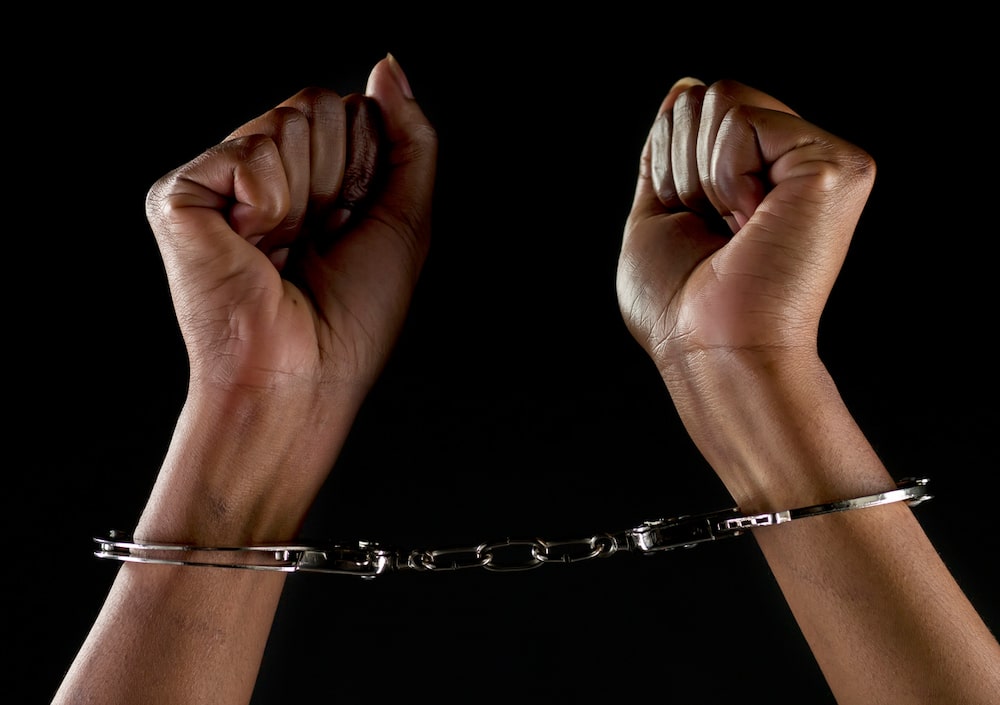The overrepresentation of Aboriginal and Torres Strait Islander peoples in the ACT justice system has worsened, according to the Productivity Commission’s Report on Government Services (RoGS) published this week.
Winnunga Nimmityjah Aboriginal Health and Community Services and the ACT Council of Social Service (ACTCOSS) called the statistics “distressing”.
Aboriginal and Torres Strait Islander people are 20 times more likely to be in prison in the ACT than non-Indigenous people, representing 26 per cent of the Alexander Maconochie Centre (AMC) prison population.
Whilst the total number of people in the prison has gone down, and is at its lowest since 2014-15, the number of Aboriginal and Torres Strait Islander detainees has not lessened.
Aboriginal and Torres Strait Islander people are still 12 times more likely to be under a community corrections order than non-Indigenous people in the ACT.
Completion of community corrections orders is at an all-time high, and completion rates for Aboriginal and Torres Strait Islander people in the ACT are above the national average.
The percentage of eligible detainees receiving education and training is at an all-time low in the ACT, and the second lowest in the country at 11.5 per cent, well below the national average of 23.7 per cent.
“Whilst it is promising to see an overall reduction in the total number of people in prison, it is deeply concerning that there has not been a reduction in the number of Aboriginal and Torres Strait Islander detainees,” Julie Tongs OAM, Winnunga Nimmityjah’s CEO, and Dr Gemma Killen, ACTCOSS’s acting CEO, said.
“The steep decline in education and training of detainees also underlines a major issue that has been consistently raised by community sector workers.”
Indigenous overrepresentation
There were 101 Aboriginal and Torres Strait Islander prisoners at the AMC in 2021–22, twice as many as there were in 2012–13 (47).
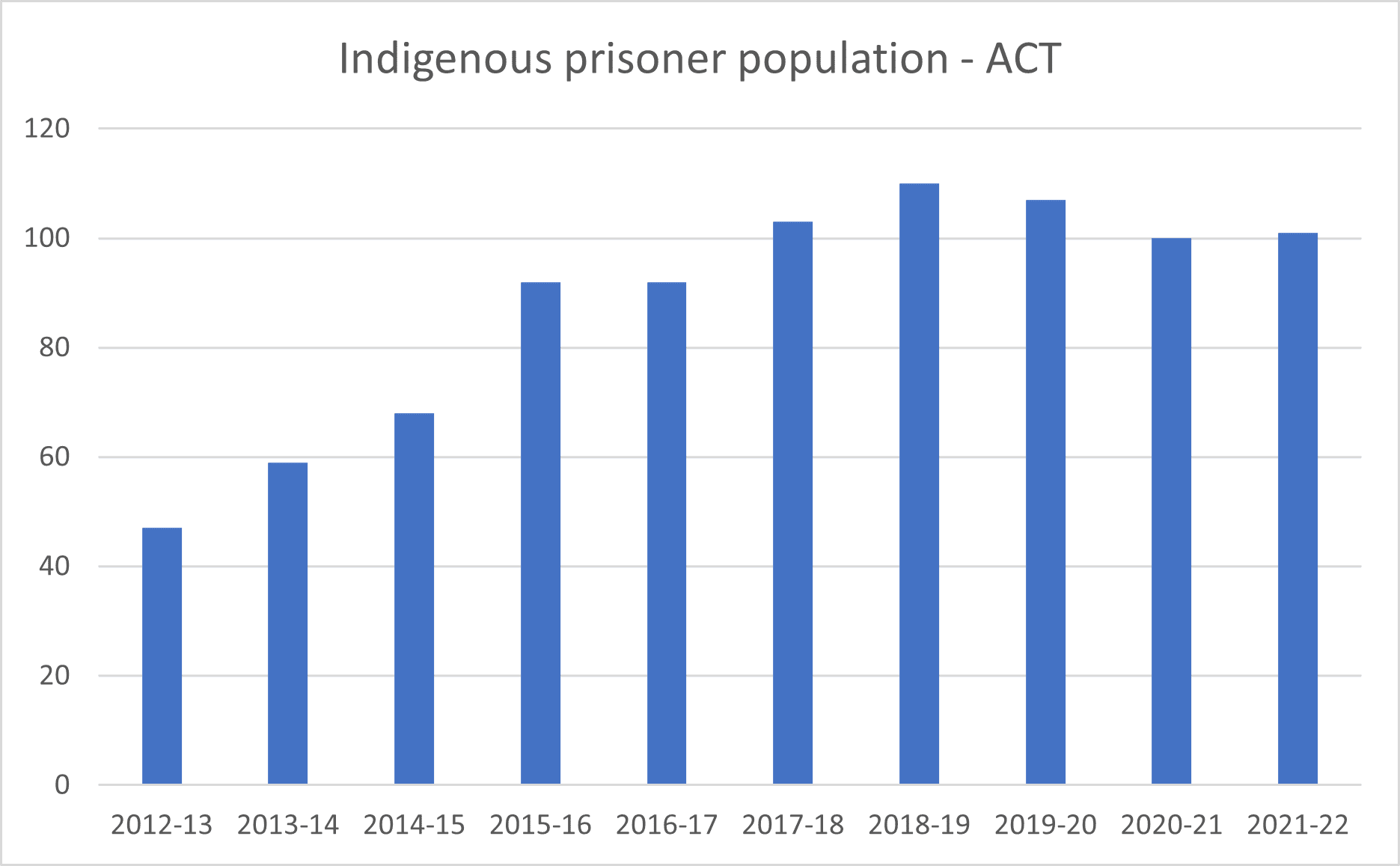
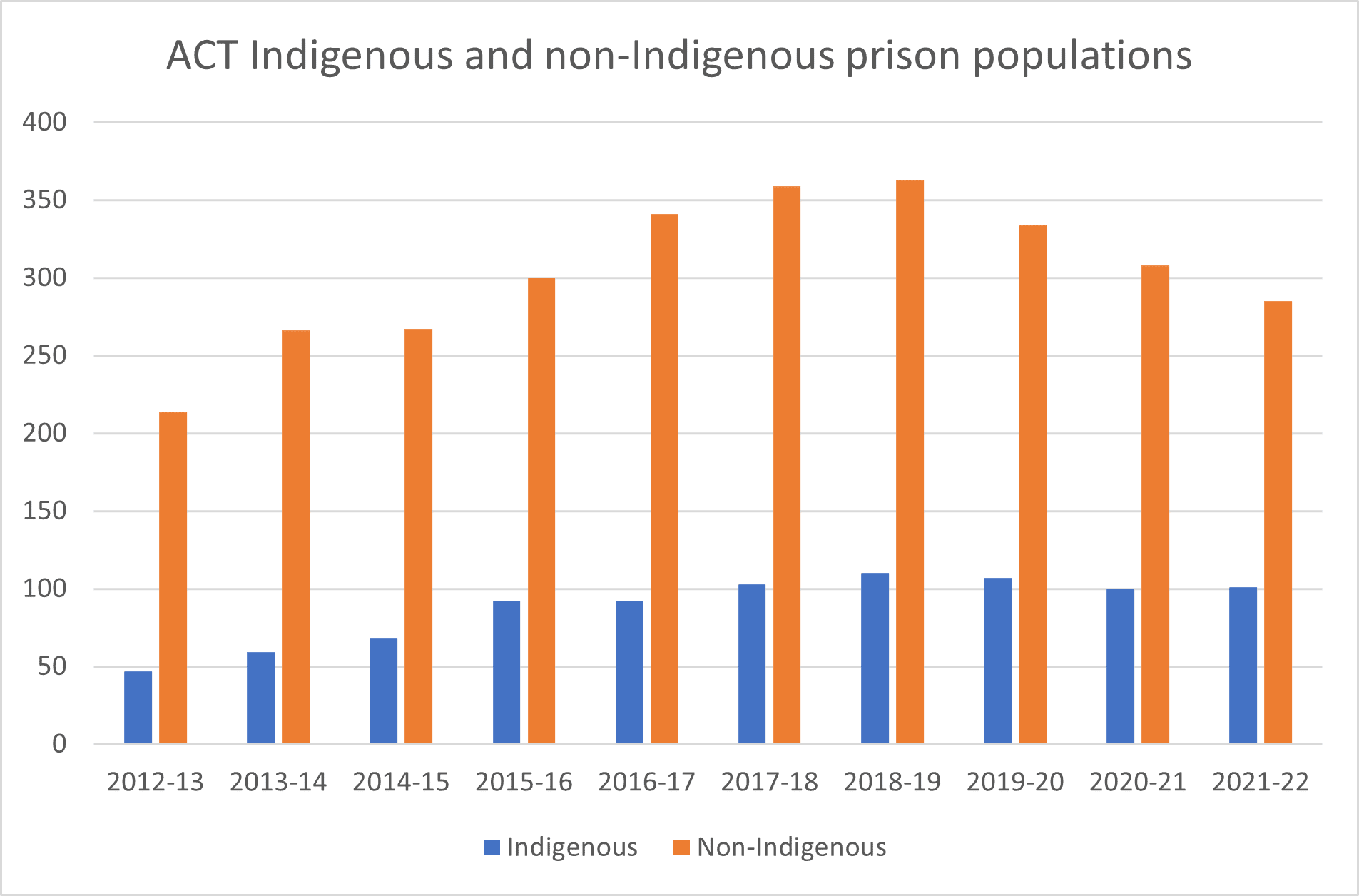
While Aboriginal and Torres Strait Islander people make up only a quarter of the prison population at the AMC, Indigenous people are 20 times more likely to be in prison in the ACT: 1,770.3 Indigenous detainees per 100,000 adults, compared to 86.5 non-Indigenous.
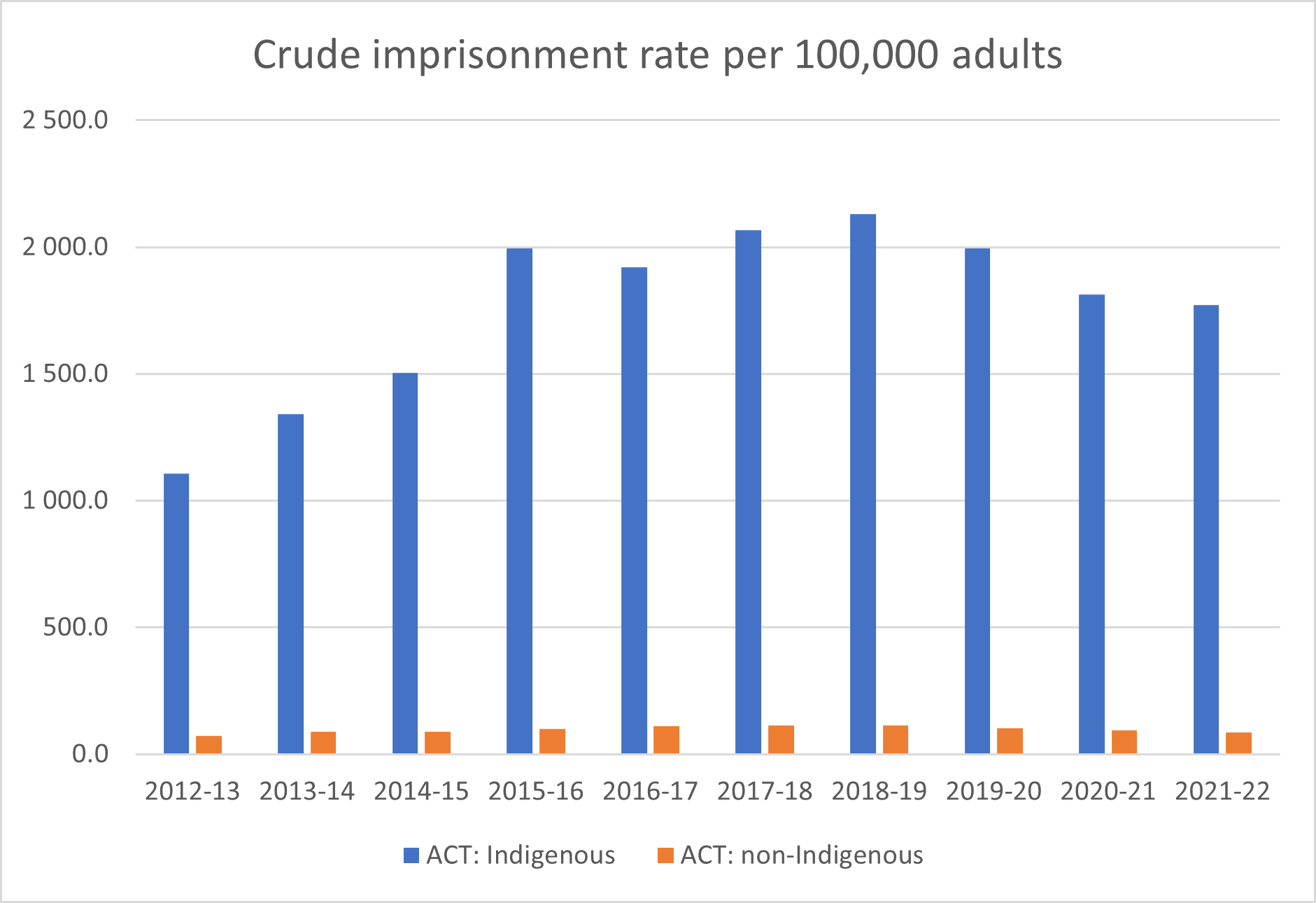
The Indigenous imprisonment rate in the ACT increased by 1.6 over the same period – but has decreased since 2015–16. At its peak in 2018–19, the Indigenous incarceration rate was nearly double the 2012–13 rate.
Currently, it is the third lowest in the country, after Tasmania and Victoria.
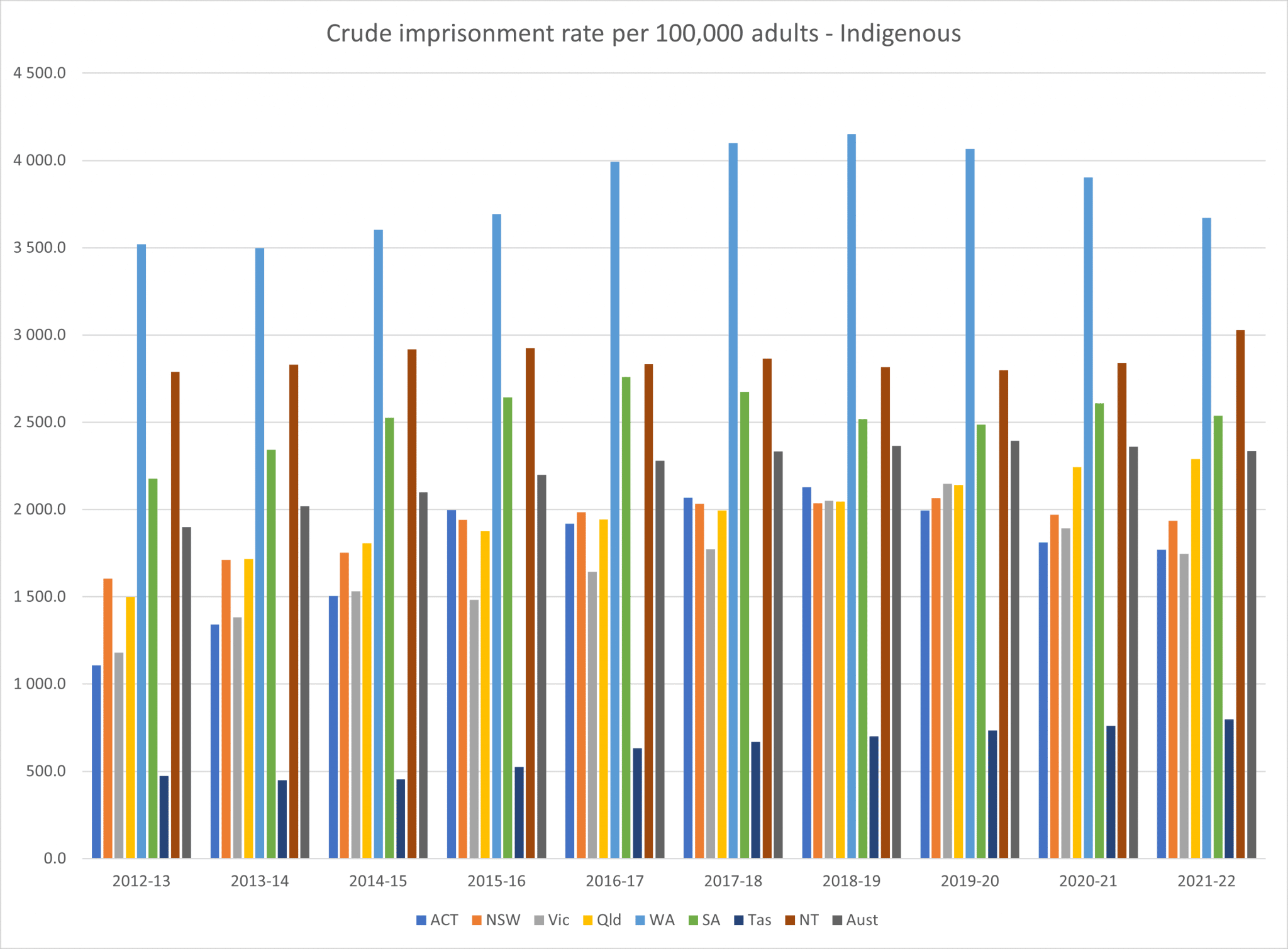
“The over-incarceration of Indigenous people in the ACT continues to be an area of extreme concern,” Dr Killen (ACTCOSS) said. “Without appropriate action, the number of Aboriginal and Torres Strait Islander detainees will continue to grow rapidly in the ACT.
“The proportion of Aboriginal and Torres Strait Islander detainees in the ACT has doubled in the last decade, with the highest ratio of incarceration and highest levels of recidivism in the country.”
ACT Government response
“The ACT Government is committed to helping address the over-representation of Aboriginal and Torres Strait Islander people in the criminal justice system,” Mick Gentleman, ACT Minister for Corrections, said.
Mr Gentleman acknowledged that Aboriginal and Torres Strait Islander people were overrepresented in the Australian criminal justice system, “as both offenders and victims, principally due to historical social disadvantage, social exclusion, and systemic societal racism”.
Mr Gentleman attributed the ACT’s low rankings to its small size skewing results.
“When considered nationally, the ACT jurisdiction has a comparatively small custodial population and one custodial facility,” Mr Gentleman said. “This means that changes in the detainee population will have significant impacts on custodial demographic proportions.”
For example, as at 18 January, the AMC had 116 Aboriginal and Torres Strait Islander detainees:
- Aboriginal and Torres Strait Islander detainees accounted for 29.9 per cent of the total AMC detainee population.
- Aboriginal and Torres Strait Islander men accounted for 28.5 per cent (103) of the total 362 AMC male detainees.
- Aboriginal and Torres Strait Islander women accounted for 50 per cent (13) of the total 26 AMC female detainees.
“While we are seeing gradual improvement in recidivism rates, there is no doubt that this continues to be part of the problem,” Mr Gentleman said.
RoGS recidivism data for the last five years showed the number of Aboriginal and Torres Strait Islander detainees returning to prison with a new sentence within two years was improving, Mr Gentleman said. The recidivism rate for Indigenous people fell from 55.2 per cent in 2016–17 to 44 per cent in 2020–21.
The recidivism rates and rate of detainees returning to ACT Corrective Services, Mr Gentleman explained, are influenced by both individual circumstances (access to housing, education, and employment) and broader systemic issues: of the human service system’s capacity and capability to support offenders to reduce offending behaviour (access to drug and alcohol treatment and mental health treatment in the community) and the complex legacy of colonisation, dispossession, institutional racism, and intergenerational trauma.
The government is finalising an Aboriginal and Torres Strait Islander Framework that provides best practice principles to assist staff working with Aboriginal and Torres Strait Islander peoples throughout the justice system, and mechanisms to improve social outcomes both during and after incarceration.
“This work sits within the broader context of the ACT Aboriginal and Torres Strait Islander Agreement 2019 – 2028 and the National Agreement on Closing the Gap to which the ACT Government is a proud and committed partner,” Mr Gentleman said. “Both agreements address justice system engagement, and guiding work across government to address the interconnected aspects of disadvantage that may contribute to incarceration.
“The ACT Government will continue to engage with the Aboriginal and Torres Strait Islander community to continually improve outcomes for Indigenous detainees.”
Community corrections orders
Aboriginal and Torres Strait Islander people in the ACT are 12 times more likely to be under a community corrections order than non-Indigenous people: a crude rate of 2,789 Indigenous people per 100,000 adults, compared to only 233 non-Indigenous. This is the third highest rate in the country.
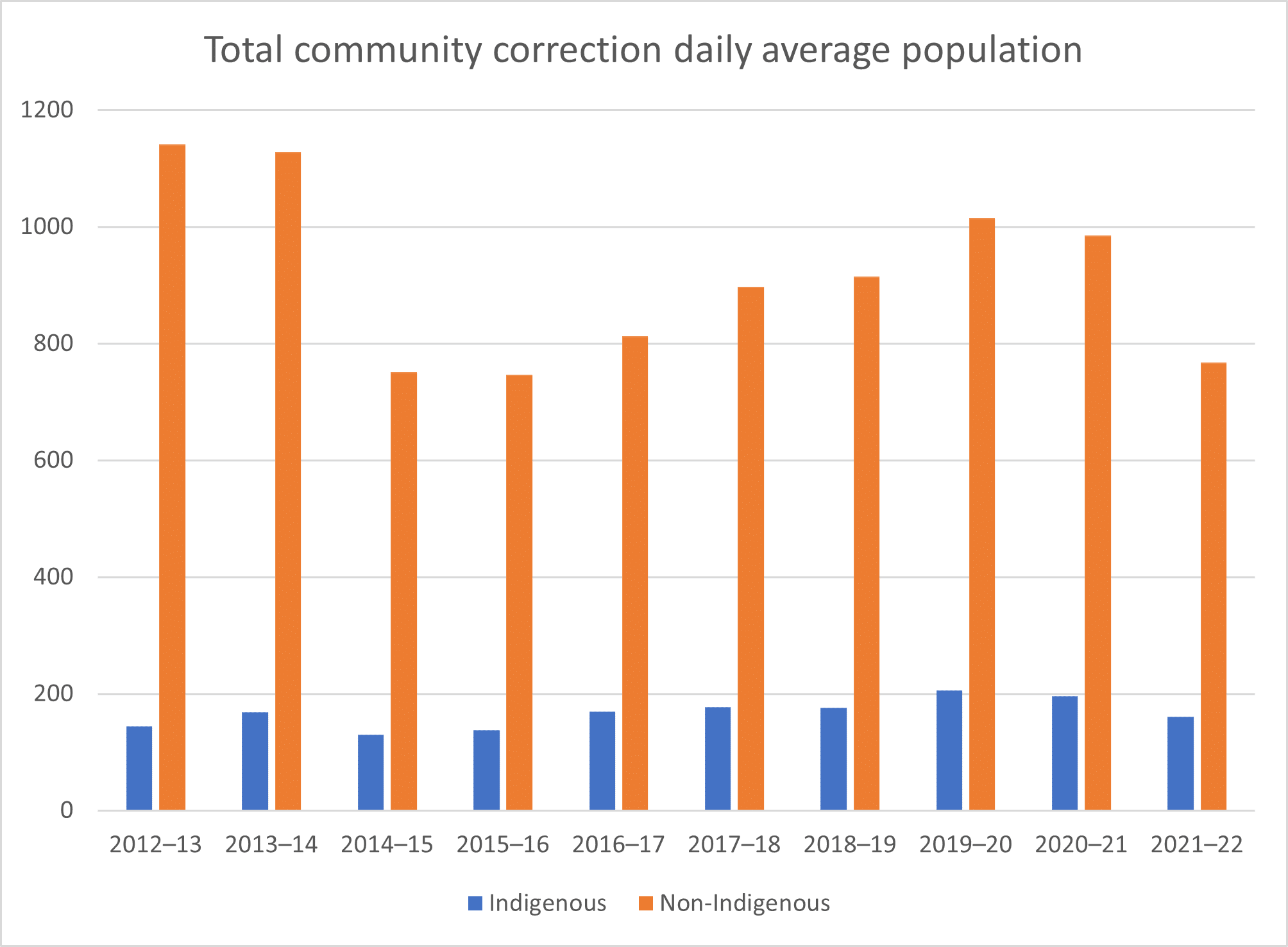
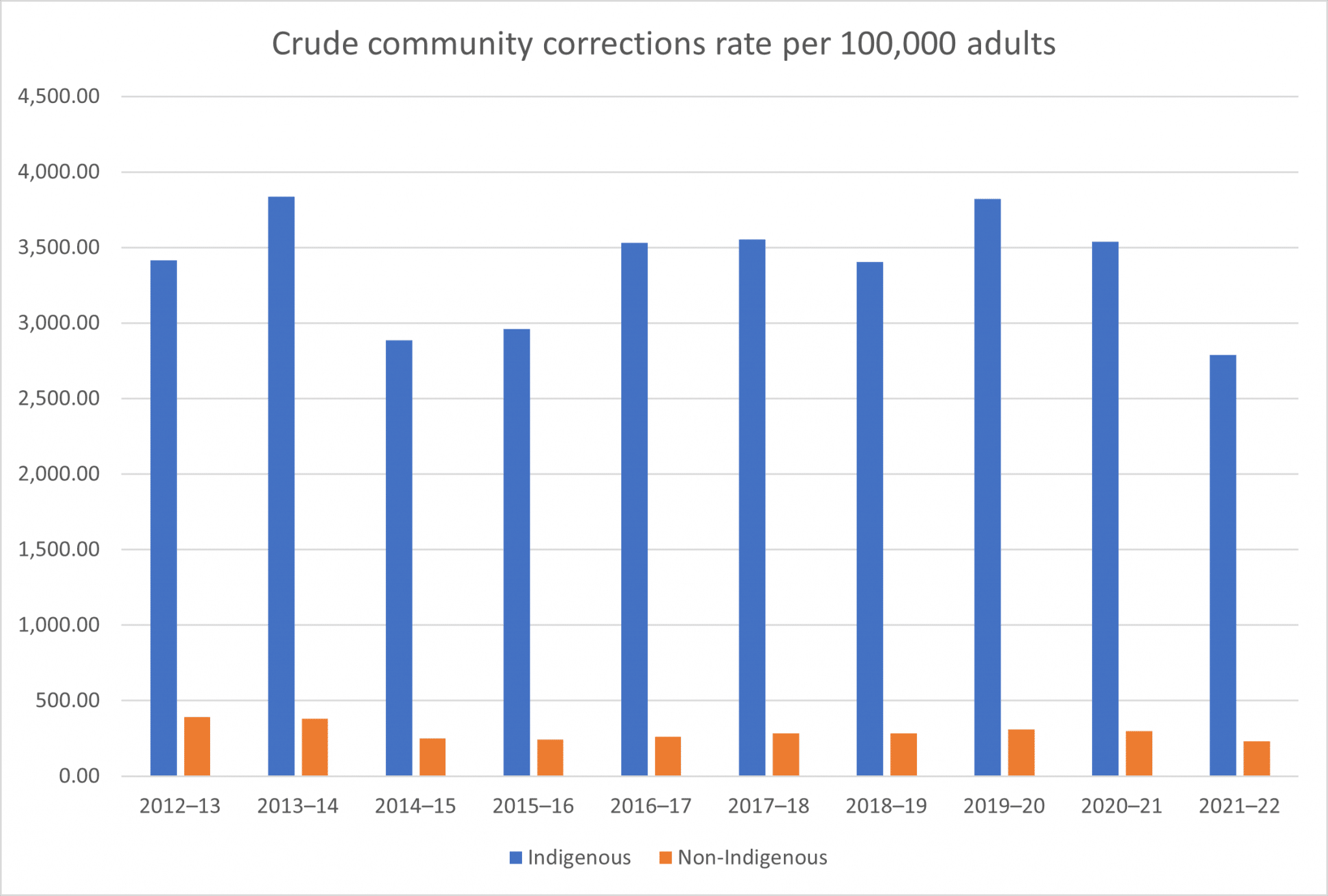
However, the ACT has the highest percentage of Indigenous people (79 per cent) who have completed community corrections orders, while overall, more people have completed community corrections than ever before (83 per cent).
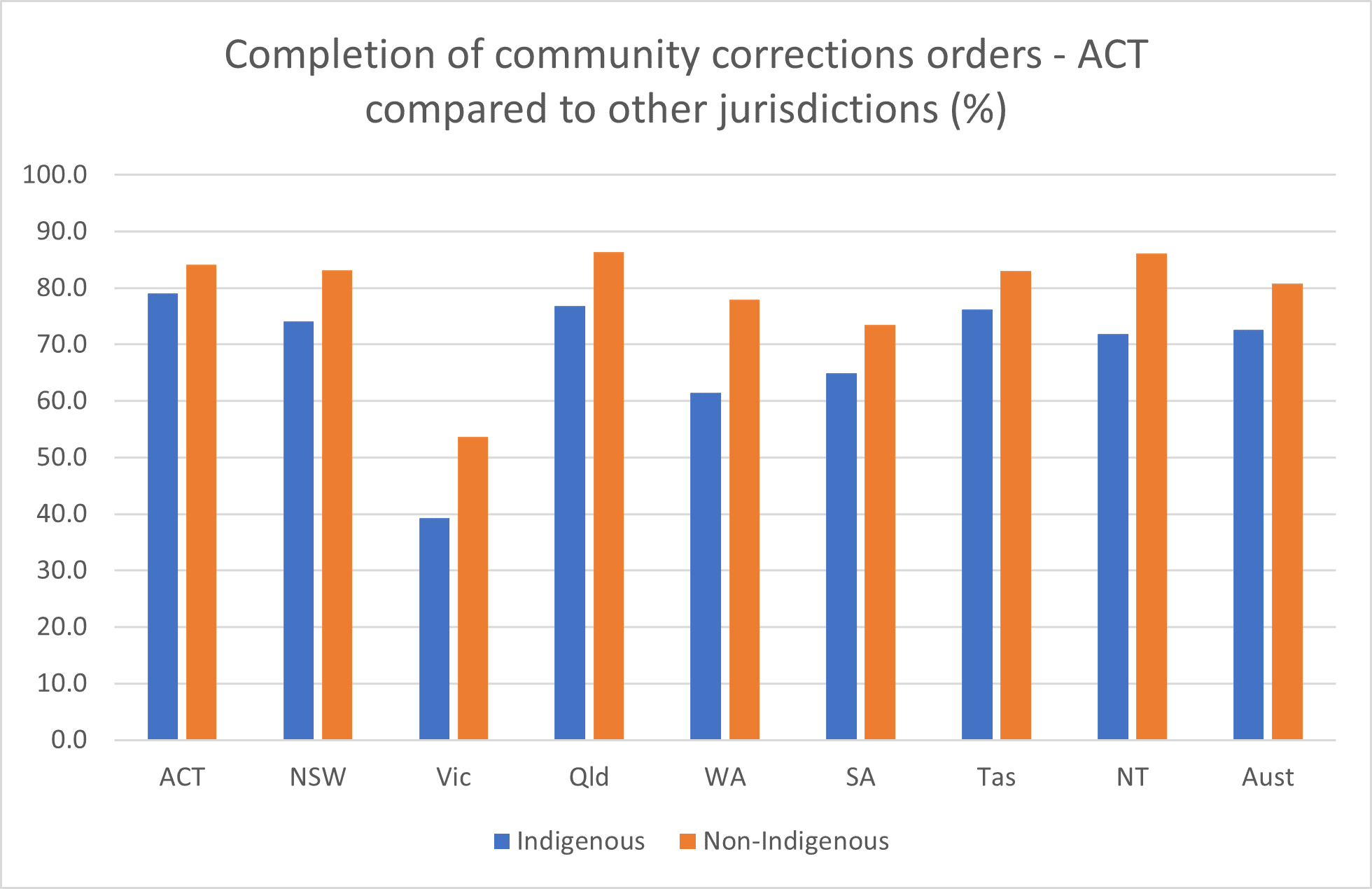
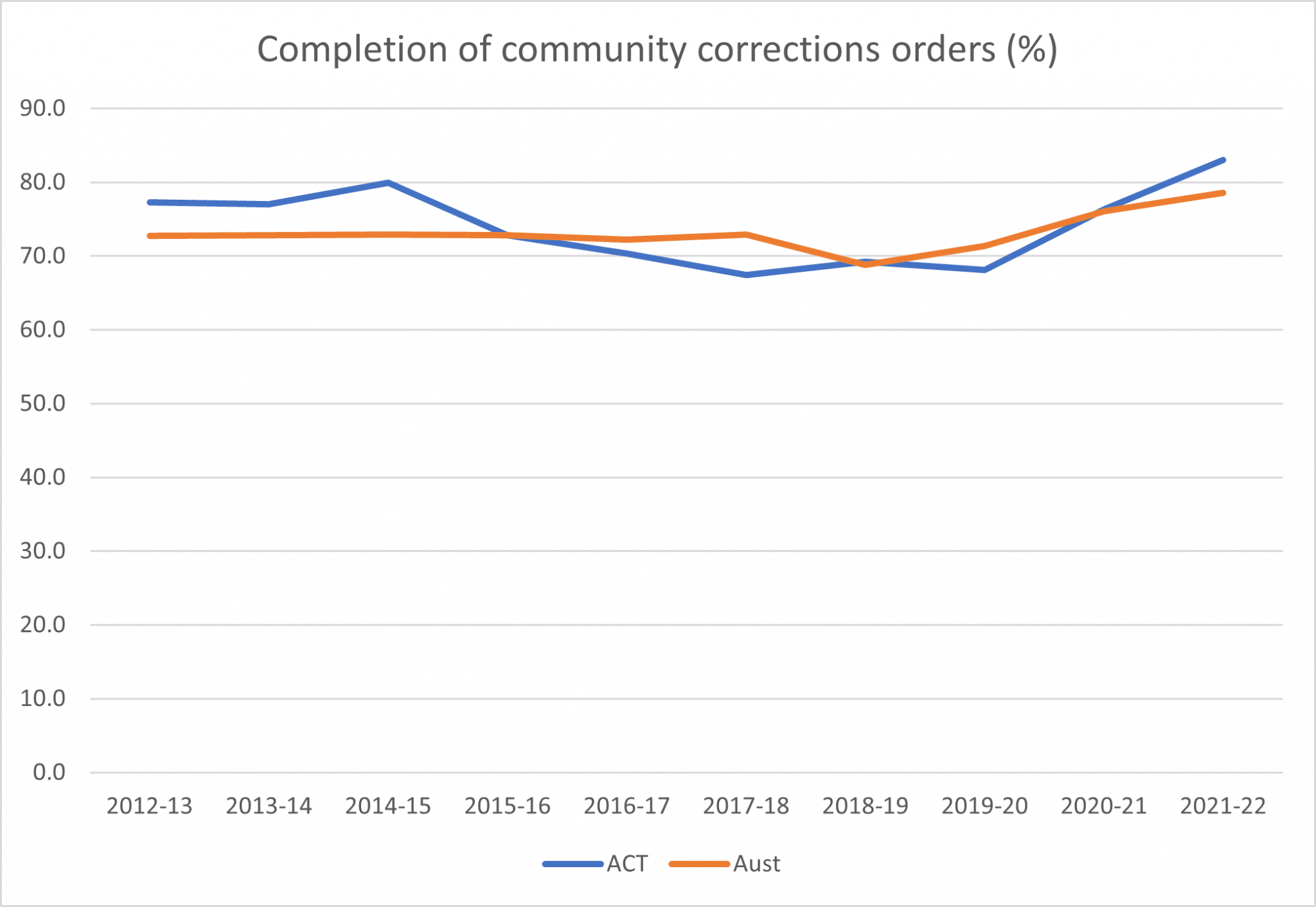
“This progress is a testament to the success of alternative reporting sites, such as the one at Winnunga Nimmityjah Aboriginal Health and Community Services, and indicative of the kind of community-led programs that the ACT Government needs to be investing in for better outcomes,” Dr Killen said.
Education and training
The percentage of eligible detainees receiving education and training nosedived to 11.5 per cent in 2021–22, down from 68.5 per cent in 2020–21, and 81.8 per cent in 2012–13. This is the second lowest result in Australia, well below the national average of 23.7 per cent.
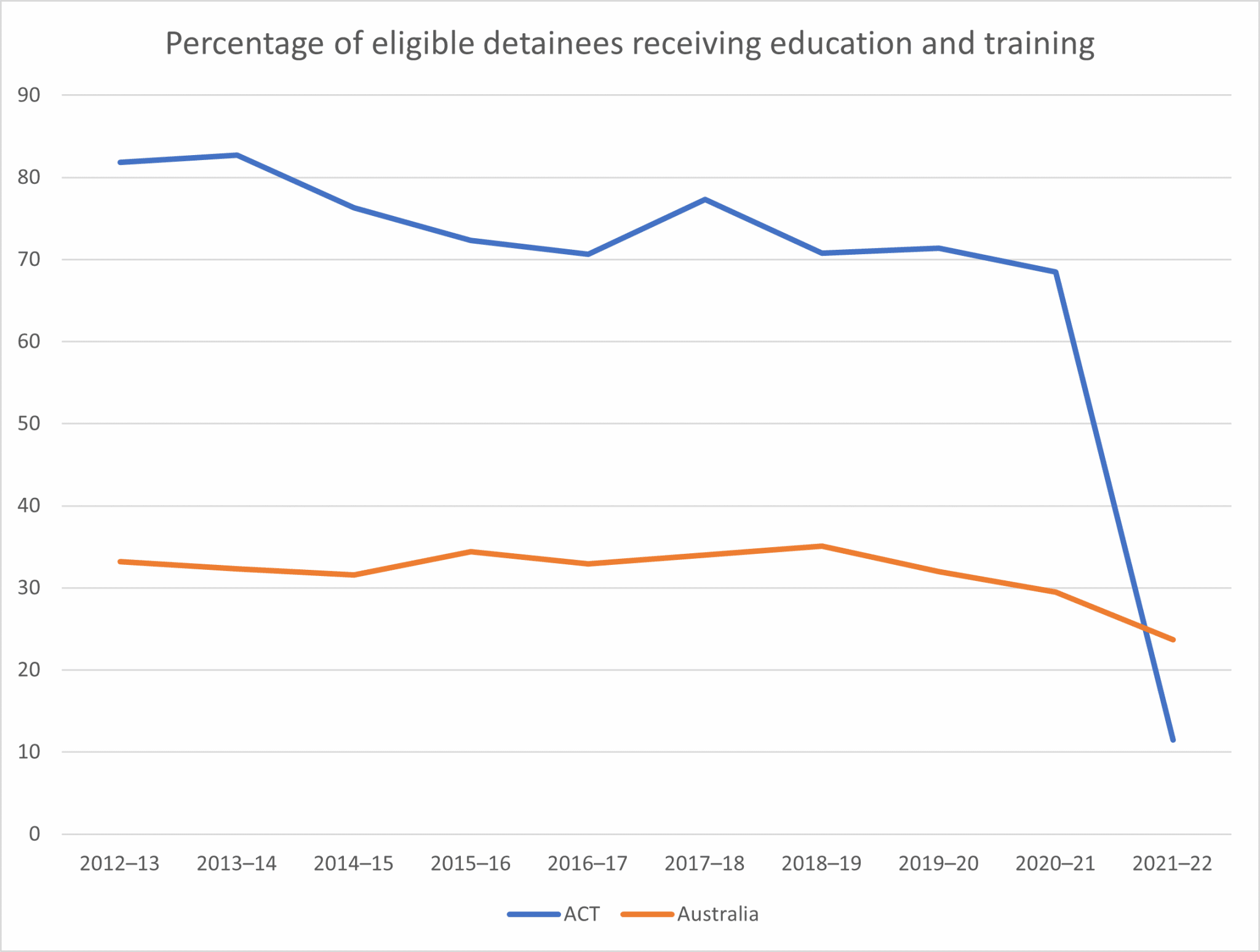
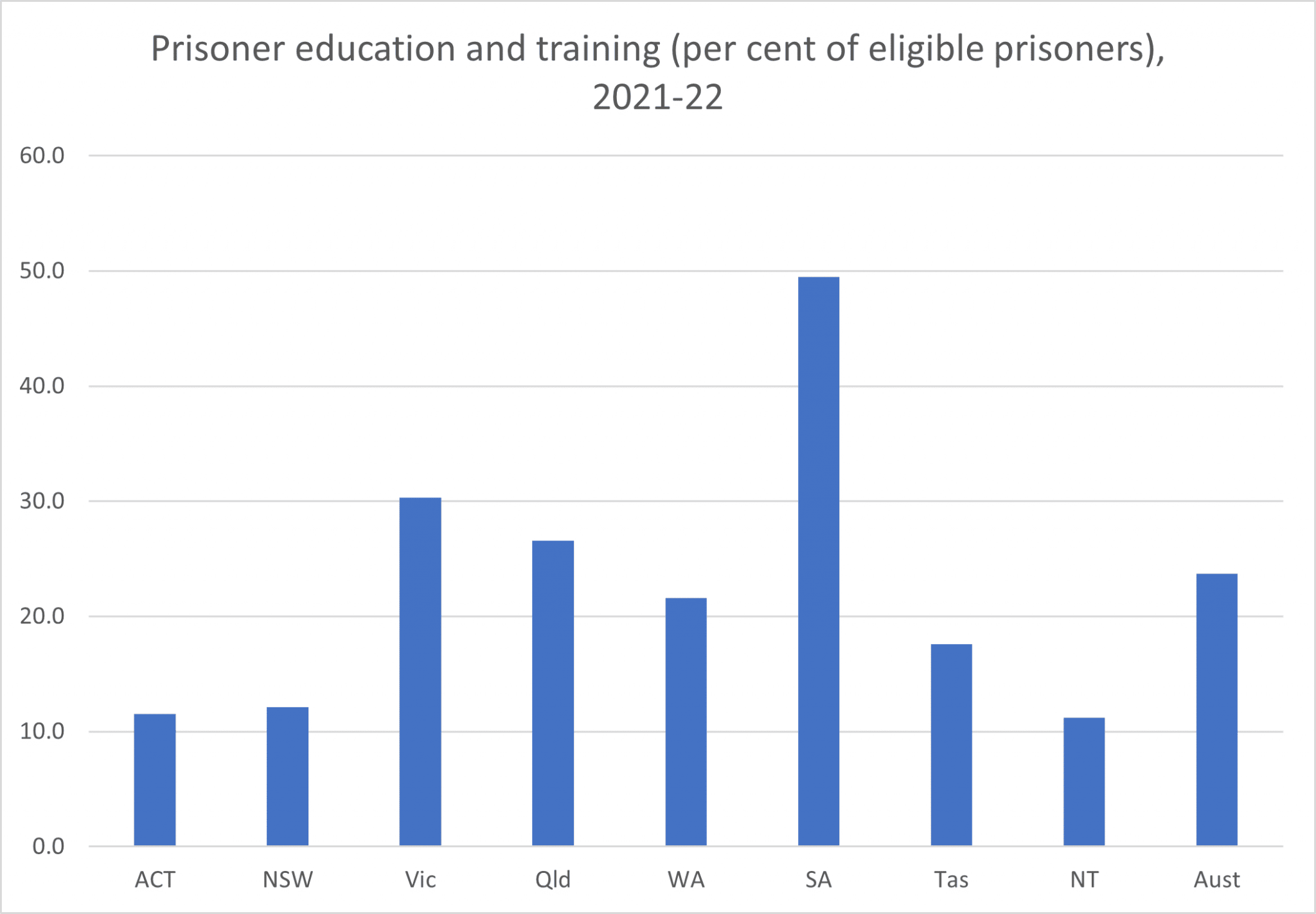
“Plummeting levels of education and training for detainees have been an area of great concern to the community sector for years, pointing to a major failure of the ACT Government to respond to need and prepare detainees for life after prison,” Dr Killen said.
The ACT Inspector of Correctional Services’ report in November noted that no education had been provided at the AMC since September 2021, and no education provider or recommencement date had been confirmed.
- Review finds conditions for ACT prisoners have worsened (30 November 2022)
“Due to the impacts of COVID 19, including staffing availability and ability to access the AMC, the contracted education service provider was unable to provide its services at the AMC from August 2021,” Mr Gentleman said this week.
“Unfortunately, the ACT Government was unable to find another provider able to deliver a full suite of educational services in such a way that offered value for money for the Territory. This has meant that a full suite of education services was not offered to detainees at the AMC for the remainder of the ROGS reporting period.”
This year, however, a range of vocational education units will be offered, including the Certificate II in Cooking, Construction Units, White Card Course, Asbestos Awareness Course, and Language, Literacy and Numeracy assessments.
Courses in Aboriginal Art and Culture studies, Foundational Skills (to support language, literacy, and numeracy skills) and Work Health and Safety will be provided later this year.
“Sourcing of additional educational options will continue to ensure a diverse selection of education opportunities to support detainee rehabilitation and reintegration,” Mr Gentleman said.
“Detainee participation numbers are expected to increase substantially once a full suite of education services returns.
“The ACT Government remains committed to educational opportunities for detainees in the AMC.”
Julie Tongs: ACT Government must invest more
Julie Tongs OAM, CEO of Winnunga Nimmityjah Aboriginal Health and Community Services, said: “The statistics continue to demonstrate that the ACT Government is failing to take appropriate actions to prevent over-incarceration and discrimination. Aboriginal and Torres Strait Islander peoples are being disadvantaged at every step, not just in the justice system but in access to housing, education, healthcare, and mental health services.
“Resolving this widespread injustice requires urgent investment in Aboriginal community-controlled organisations. These organisations are best placed to provide culturally safe and appropriate services across health, housing, drug and alcohol treatment services, and justice. This is a whole of community problem and requires a whole of government response to prevent further pain and inequity.”
ACT Government investment
“The ACT Government,” Mr Gentleman said, “is committed to investing in significant infrastructure improvements, service expansions, and support for existing Aboriginal and Torres Strait Islander Community-Controlled Organisations (ACCOs) as well as working in partnership with the community in the development and support of new and emerging ACCOs in areas of service need.”
In 2020–21, the ACT Government invested $4.7 million in Aboriginal community-controlled organisations; in 2019–20, it invested more than $13 million. (The amount invested can vary from year to year, as specific projects or new initiatives are developed, Mr Gentleman noted.)
He said that to address overincarceration, the ACT Government funded the following programs delivered by First Nations organisations:
- Yarrabi Bamirr: provides a family-centric model of support for First Nations families to reduce or prevent contact with the justice system and consequently, improve life outcomes.
- Throughcare: a client-centred program designed to enable First Nations clients to succeed as they transition from prison to living back in the community. The program works with the ACT Corrective Services Throughcare Unit to provide individualised and intensive case management and trauma informed support.
- Empowering Yarning Circles: help ex-detainees to stay in the community and rebuild their lives.
- Front Up: provided by the Aboriginal Legal Service NSW/ACT to support First Nations people who have an outstanding warrant(s) or have breached bail or a community-based sentence.The program helps them to present to Court, and negotiates on their behalf to have the matter resolved, where possible, without a period in custody.
- Ngurrambai Bail Support Program: includes support for court-based bail, outreach bail, the Alexander Maconochie Centre, and after-hours bail. It is designed to reduce the number of First Nations people on remand, and help First Nations people to apply for, gain, and stick to their bail conditions.
- Galambany Circle Sentencing Support: supports people appearing before the Galambany Circle Sentencing Court. This Court gives eligible First Nations adults who have committed an offence a culturally relevant sentencing option, in consultation with local Elders. The Court Support program offers transport to and from court, as well as to any recommended or court-appointed appointments or programs.
A trial expansion of Galambany to hear bail applications was conducted in early 2022, and delivered positive results, Mr Gentleman said. All AMC detainees who appeared in Galambany were granted bail, thus avoiding incarceration at AMC.
The government has committed funding for Galambany bail court to operate once a week for First Nations people who are not granted bail on first appearance. If refused bail in the general bail list, defendants will be referred to the Ngurrambai Bail Support program with the Aboriginal Legal Service to provide support and legal advice to seek bail through the Galambany Court. This will enable First Nations defendants, whether pleading guilty or not guilty, to access culturally appropriate services for bail support and management.
The ACT Government has also:
- constructed a purpose-built facility to increase the service capability for Winnunga Nimmityjah Aboriginal Health and Community Services
- designed a purpose-built facility in collaboration with Gugan Gulwan Youth Aboriginal Corporation
- supported Yerrabi Yurwang Child and Family Aboriginal Corporation as a new and emerging organisation
- worked towards transitioning Boomanulla Oval and Yarramundi Cultural Centre to sustainable community control
- established ACCOs providing support to people exiting or being diverted from the justice system
- supported existing ACCOs to support families and young peoples through the COVID pandemic, and
- developed Sector Strengthening Plans under the National Agreement. These plans focus on Early Childhood Care and Development, Housing, Health, and Disability, detailing how the government will support Aboriginal and Torres Strait Islander organisations in these sectors to develop their workforce, capital infrastructure, service provision, and governance.
Canberra Daily is keen to hear from you about a story idea in the Canberra and surrounding region. Click here to submit a news tip.

